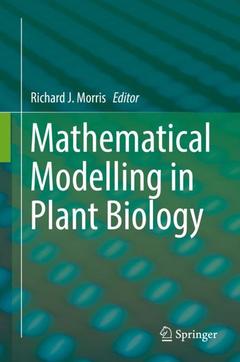Description
Mathematical Modelling in Plant Biology, 1st ed. 2018
Coordinator: Morris Richard J.
Language: English
Subject for Mathematical Modelling in Plant Biology:
219 p. · 15.5x23.5 cm · Hardback
Description
/li>Contents
/li>Biography
/li>Comment
/li>
Progress in plant biology relies on the quantification, analysis and mathematical modeling of data over different time and length scales. This book describes common mathematical and computational approaches as well as some carefully chosen case studies that demonstrate the use of these techniques to solve problems at the forefront of plant biology. Each chapter is written by an expert in field with the goal of conveying concepts whilst at the same time providing sufficient background and links to available software for readers to rapidly build their own models and run their own simulations. This book is aimed at postgraduate students and researchers working the field of plant systems biology and synthetic biology, but will also be a useful reference for anyone wanting to get into quantitative plant biology.
Richard J Morris' research aims to shed light on the physics of information processing in plants. He completed a degree in Mechanical Engineering at the age of 19 before obtaining a BSc in Physics and then an MSc in Theoretical Physics in 1996 from the Erzherzog University of Graz, Austria. He won an EMBL fellowship to carry out his PhD research at the European Molecular Biology Laboratory (EMBL) in the field of computational protein crystallography with Dr Victor Lamzin. After completing his PhD in 2000, Richard joined the group of Dr Gerard Bricogne (MRC-LMB Cambridge & Global Phasing Ltd) to work on Bayesian approaches for protein structure solution. Richard then joined the group of Dame Prof Janet Thornton, FRS, at the European Bioinformatics Institute (EMBL-EBI) in 2002, where he developed novel shape mathematics for protein function prediction. In 2005, Richard was recruited to the bioinformatics group at the John Innes Centre (JIC) as a tenure-track project leader. Richard played a key role in building up computational biology at JIC. He became Head of Department for Computational and Systems Biology in 2010. In 2013 he took on the role of institute strategic programme leader as an associate director. He is active in promoting quantitative, and in particular physical, approaches to plant biology and in training the next generation in mathematical modelling and computational methods.
Contributions by the world's leading researchers in mathematical and computational biology
Demystifies quantitative biology for plant scientists
Carefully chosen examples and paradigms that illustrate the power of predictive modelling in plant biology
These books may interest you

Biology of Plant Volatiles 188.53 €



